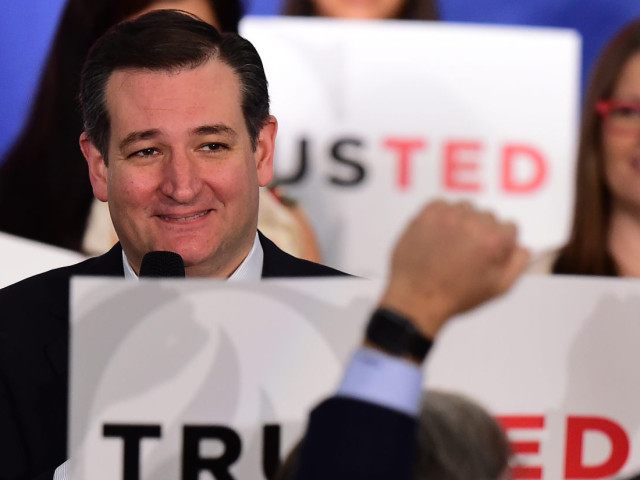The question of whether business tycoon Donald Trump clinches the 1,237 pledged first-ballot delegate votes needed to win at the Republican National Convention in Cleveland in July will only be decided in delegate-rich California.
The race for the Republican nomination was not decided Tuesday, with Trump’s sweep through the liberal northeastern states. Nor will the battle end with the GOP primaries throughout May in Indiana, Oregon (or as Trump pronounces it “Or-E-Gone”) or Washington State.
When the polls close on June 7, only then will we know whether Senator Ted Cruz (R-TX) will have stopped Trump, and set the stage for a convention showdown.
California will ultimately be a Trump-Cruz contest. While Ohio Governor John Kasich will, no doubt, still be running, his anemic effort to show that the establishment still has a horse in the race will be irrelevant to those California GOP voters who do not want Trump. To them, it will be clear that Cruz is the only one really positioned to compete for delegates.
California is a winner-take-all-by-district contest: 159 delegates will be awarded – three to the top-vote-getter in each of the state’s 53 Congressional Districts, with the ten statewide delegates and the voters of the three California RNC members going to the statewide plurality winner.
To stop Trump, Cruz will likely need significantly less than half of California’s delegates, as Trump needs to win over 50% of the remaining 622 delegates, and the map ahead for the reality-TV celebrity isn’t as friendly as it was yesterday.
Which takes us to the reality of the California political landscape, where statewide polling might be a decent indicator of how the 13 statewide delegate votes are likely to go, but the district-by-district showdown is a much different story.
There are two major reasons why recent surveys showing the Trump has a lead in California don’t hold up under scrutiny.
The first is that these polls are not broken down by district, but by region. In fact, the number of respondents to the surveys aren’t even a small sliver of the number that would be needed to predict voter opinions in 53 U.S. House seats. You would need hundreds of surveys completed in each seat. As an anecdotal example, the April Field poll, a very reputable public opinion survey released periodically, had only 588 interviews with likely GOP voters statewide — barely ten per district, on average.
The second reason to distrust the polls is that California has a huge number of ultra-liberal House districts where mere thousands of Republican voters in each will be deciding three delegate votes. You could not accurately survey this small number of GOP voters even if you wanted to – other than perhaps going out and interviewing each resident of the district.
In the Golden State, the factors that will truly matter will be smart voter contact and grassroots organization. In both of these areas, the Cruz campaign is well positioned relative to Trump. The former has been significantly invested in smart campaigning, targeting resources, and running a tight, smart campaign using the latest advances in voter identification. Cruz has been using voter contact tools ranging from social media targeting to geofencing. On the district level, these kinds of tactical considerations matter. And as for grassroots organization, the Cruz campaign has built an impressive armada all around the state, with an organizational structure and grassroots leaders in literally all 53 House districts.
Two anecdotes demonstrate the Cruz campaign’s organizational heft. One is the speed with which the campaign pulled together its delegate statewide slate – no small feat, since it includes delegates and alternates in every single congressional seat. And not just warm bodies – but conservatives committed to Cruz, and willing to travel to Ohio on their own dime!
The other anecdote is Cruz’s last visit to Southern California, just a couple of weeks ago. Two rallies, one in Orange County and one San Diego County, were announced at 9 p.m., and by 8 a.m. the following morning both had sold out, with thousands of attendees. Yet these rallies had only been advertised internally, to identified supporters and local party activists.
By contrast, Trump has had no organization to speak of in California, only hiring a staff person a couple of weeks ago. He is still trying to fill out a delegate slate, and seems to hope he can finesse California with a 30,000-foot campaign. (And of course there really is no Kasich campaign here at all, unless you count an endorsement from Arnold Schwarzenegger.)
Look for Donald Trump to continue to call himself the “presumptive nominee” of the party as he seeks to try to steamroll through the rest of the primary calendar. But if he’s actually going to reach the magic number of delegates, he needs to organize in California – fast. His problem is that Cruz has been at it here for over a year.
_______________
Jon Fleischman is the Politics Editor of Breitbart California. A longtime participant, observer and chronicler of California politics, Jon is also the publisher at www.flashreport.org. His columns appear on this page. You can reach Jon at jon@flashreport.org. Fleischman is a supporter Ted Cruz for President.

COMMENTS
Please let us know if you're having issues with commenting.